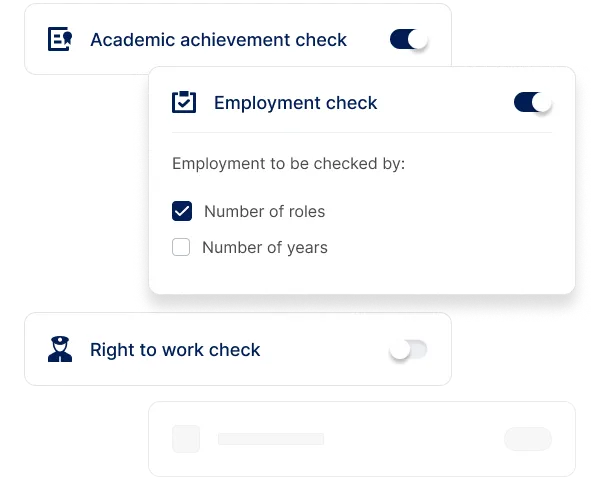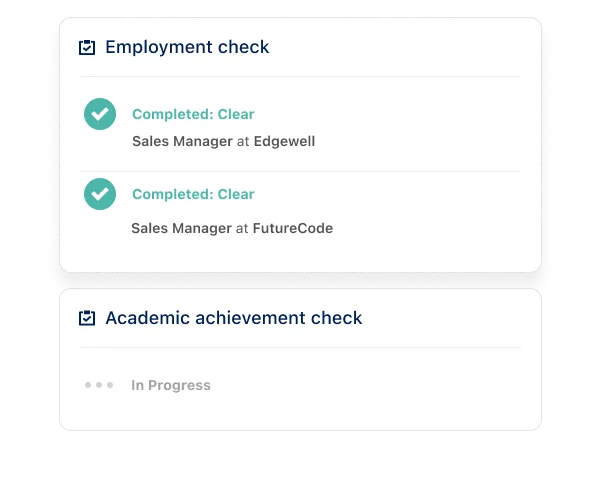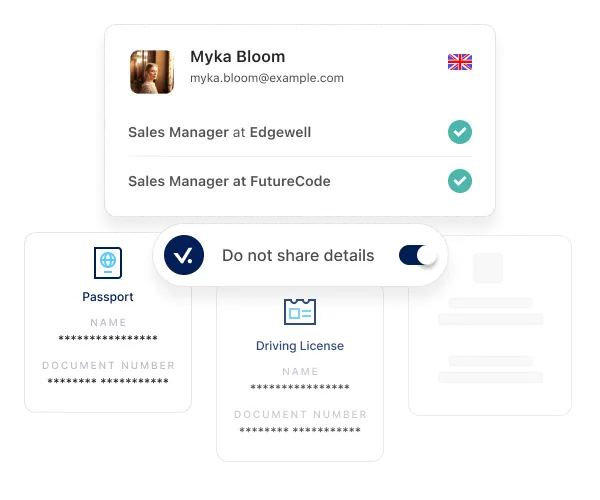Comprehensive Guide to Employment Background Checks in Denmark
Everyday, Veremark carries out background screening all over the world for companies who need checked and verified employees. If you’re looking for background checks in Denmark, here’s some information that might help.
As one of Europe’s most prosperous nations with a strong welfare state and thriving economy, Denmark is an attractive destination for businesses looking to expand their operations. Employment background checks play an essential role in helping organisations verify the credentials of potential employees and ensure compliance with local and international standards. Whether you're a local business or a global company hiring in Denmark, understanding the nuances of background screening in this country is key to mitigating risk and making informed hiring decisions.
This comprehensive guide will explore the legal framework, types of background checks, and best practices for conducting employment background checks in Denmark.
Introduction to Denmark's Growing Economy and Workforce
Denmark boasts a highly skilled workforce, a stable political environment, and an economy driven by innovation, particularly in sectors such as pharmaceuticals, renewable energy, IT, and advanced manufacturing. The country is known for its progressive labour laws, which contribute to a balanced and fair working environment. In recent years, Denmark has also become a hub for start-ups and digital businesses, further increasing the demand for top talent.
As the job market grows more competitive, Danish employers need to be diligent in their hiring processes. Employment background checks provide a critical safeguard, enabling companies to verify qualifications, assess potential risks, and ensure a secure and trustworthy workforce.
Legal Framework and Data Protection in Denmark
Denmark's employment laws are designed to protect both employees and employers, with strict regulations governing how background checks can be conducted. Like all European Union countries, Denmark is subject to the General Data Protection Regulation (GDPR), which provides comprehensive guidelines on data collection, processing, and storage.
Key points in the legal framework include:
- Consent is mandatory: Employers must obtain explicit, written consent from candidates before conducting any background checks. This ensures transparency and allows candidates to understand the scope of the screening process.
- Proportionality: Background checks must be relevant to the specific role in question. Danish law mandates that employers should only request background checks that are necessary for the job. For example, a criminal background check may be appropriate for a financial position, but it may not be relevant for a low-risk administrative role.
- Anti-discrimination: The Danish Anti-Discrimination Act prohibits employers from discriminating against candidates based on personal characteristics such as gender, race, religion, or political beliefs. This means that background check results should be used fairly and consistently across all candidates.
- GDPR compliance: As part of the GDPR, employers in Denmark are required to handle personal data responsibly. This includes ensuring data minimisation (collecting only what is necessary), providing candidates with access to their data, and securely storing or deleting data once the hiring process is complete.
Common Types of Background Checks in Denmark
Employers in Denmark typically conduct several types of background checks to ensure that candidates meet the qualifications and standards required for the role. These include:
A criminal record check is one of the most common background checks in Denmark. Employers are permitted to request criminal records for roles that involve sensitive information, financial responsibility, or working with vulnerable populations. Criminal records are obtained from the Danish National Police, and the request must always be accompanied by the candidate’s written consent.
It is important to note that under Danish law, only certain convictions relevant to the role may be taken into consideration. Moreover, the employer must assess whether the information from the criminal record check is relevant to the position.

Employment verification ensures that candidates have the work experience they claim. This check involves confirming the candidate’s previous job titles, duties, and length of employment. In Denmark, employers may contact previous employers directly or use third-party verification services to ensure the accuracy of the candidate’s employment history.
This check is particularly important for senior or specialised roles where previous experience is crucial to job performance.

Education verification helps confirm the authenticity of the academic qualifications listed by the candidate. In Denmark, this check is particularly important for roles that require specific degrees, certifications, or technical expertise. Employers may verify the candidate’s qualifications by contacting the relevant educational institutions or through screening providers.

Global watchlist checks are used to screen candidates against international databases that track criminal activities, fraud, money laundering, and terrorism. These checks are especially important for roles in regulated industries, such as banking and financial services, where compliance with international regulations is mandatory.
Global watchlist checks help Danish employers ensure that their candidates have not been involved in illegal activities that could pose a risk to the business.


Seamless integration with existing hiring software
Plug our award-winning background screening software into your existing hiring workflows with Veremark's super-fast RESTful API.
Privacy and Data Security in Employment Background Checks
In Denmark, strict privacy and data security laws govern how personal information is handled during the background check process. Employers must ensure they are fully compliant with GDPR when collecting, processing, and storing personal data.
Key privacy and security considerations include:
- Data minimisation: Employers should only collect data that is necessary for the role. For instance, if a position does not involve financial responsibility, it may be unnecessary to request a financial background check.
- Secure data storage: All personal data collected during the background check process must be stored securely. Employers should implement strong security measures to prevent unauthorised access to candidate information.
- Data retention: Employers are required to retain personal data only for as long as necessary. Once the recruitment process is complete, or if the candidate is not hired, the data should be securely deleted in accordance with GDPR guidelines.
Failing to comply with data protection laws can result in severe penalties, making it essential for employers in Denmark to prioritise privacy and security throughout the background screening process.
Turnaround times
Industries Benefiting from Background Checks in Denmark
Financial Services
Given the heavily regulated nature of the finance industry, background checks are crucial to ensure compliance with local and international laws. Criminal checks and global watchlist checks are particularly relevant here.
Healthcare
In the healthcare sector, background checks are essential to verify the qualifications of medical professionals and ensure patient safety.
Technology and IT
With an increasing focus on data security and privacy, IT companies in Denmark often conduct comprehensive background checks, especially for roles that involve sensitive data.
Education
In the education sector, background checks are mandatory for roles involving work with children or vulnerable individuals, particularly in verifying criminal records and qualifications.
Best Practices for Employers Conducting Background Checks
To conduct thorough and compliant background checks in Denmark, employers should adhere to the following best practices:
- Obtain written consent: Always seek explicit consent from candidates before conducting any background checks. Inform them of the types of checks you will be conducting and ensure transparency throughout the process.
- Focus on role-specific checks: Ensure that the background checks you perform are relevant to the job. Avoid conducting unnecessary checks that do not align with the role’s requirements, as this could lead to GDPR violations.
- Partner with trusted providers: Work with reputable background check providers who are familiar with Danish laws and GDPR compliance. This ensures that the process is handled accurately and efficiently.
- Ensure compliance with GDPR: Stay up-to-date with GDPR requirements to ensure that your background check process adheres to all data protection regulations, from obtaining consent to securely storing and deleting personal data.
- Communicate clearly with candidates: Be transparent with candidates throughout the background check process. Clearly explain what is being checked, why, and how their data will be used.
How it works




Data protection by design
Vault-like security with ISO and SOC2 certification
Employment background checks in Denmark are a crucial part of the hiring process, providing employers with the information they need to make informed decisions while ensuring compliance with strict data protection regulations. With Denmark’s growing economy and increasingly competitive workforce, conducting comprehensive background checks can help businesses verify candidate credentials, mitigate risks, and build a trustworthy and skilled team.
Read more
FAQs
This depends on the industry and type of role you are recruiting for. To determine whether you need reference checks, identity checks, bankruptcy checks, civil background checks, credit checks for employment or any of the other background checks we offer, chat to our team of dedicated account managers.
Many industries have compliance-related employment check requirements. And even if your industry doesn’t, remember that your staff have access to assets and data that must be protected. When you employ a new staff member you need to be certain that they have the best interests of your business at heart. Carrying out comprehensive background checking helps mitigate risk and ensures a safer hiring decision.
Again, this depends on the type of checks you need. Simple identity checks can be carried out in as little as a few hours but a worldwide criminal background check for instance might take several weeks. A simple pre-employment check package takes around a week. Our account managers are specialists and can provide detailed information into which checks you need and how long they will take.
All Veremark checks are carried out online and digitally. This eliminates the need to collect, store and manage paper documents and information making the process faster, more efficient and ensures complete safety of candidate data and documents.
In a competitive marketplace, making the right hiring decisions is key to the success of your company. Employment background checks enables you to understand more about your candidates before making crucial decisions which can have either beneficial or catastrophic effects on your business.
Background checks not only provide useful insights into a candidate’s work history, skills and education, but they can also offer richer detail into someone’s personality and character traits. This gives you a huge advantage when considering who to hire. Background checking also ensures that candidates are legally allowed to carry out certain roles, failed criminal and credit checks could prevent them from working with vulnerable people or in a financial function.
Transform your hiring process
Request a discovery session with one of our background screening experts today.



%20(1)%20(2)%20(2)%20(1).jpg)
%20(1).webp)
